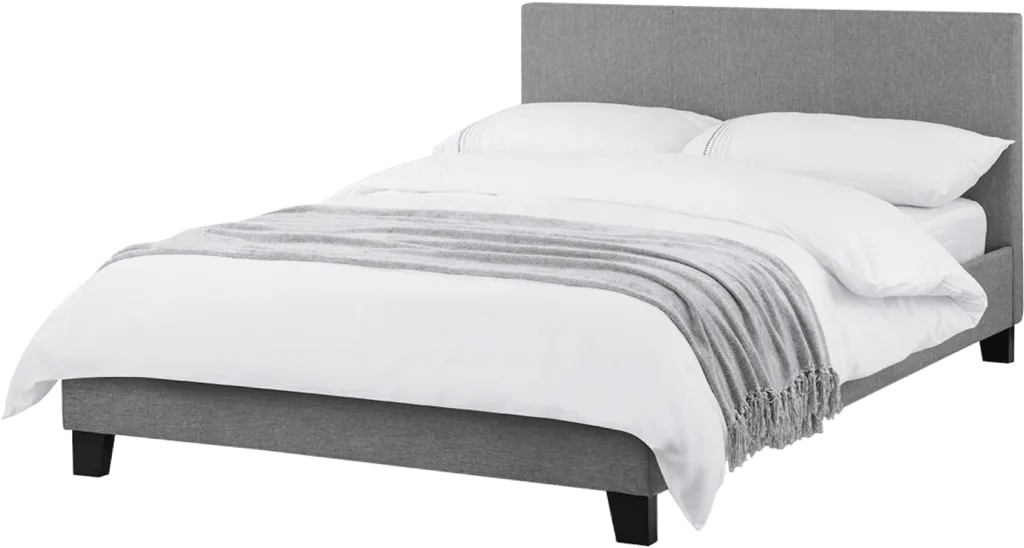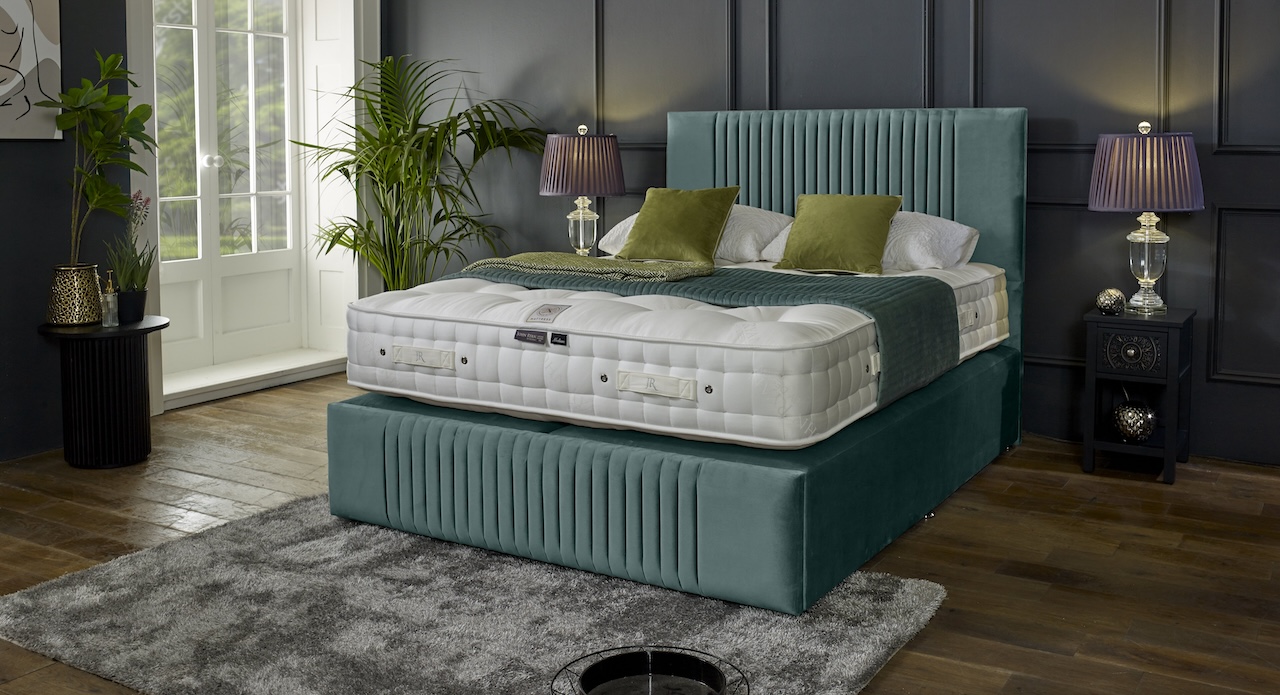10 Healthy Sleep Habits: To Boost Your Mood
1. Set your Sleep Schedule
Nearly all people who sleep better and wake up feeling ready to tackle the day have a consistent sleep schedule.
Aiming to go to bed and wake up at the same time every day, even on weekends, will help increase your sleep health and mood. We know it may sound rigid, but this is the number one tip to create a healthy sleep schedule where your body starts to sleep consistently through the night. This is because it helps establish a regular circadian rhythm, which is the foundation of deep, quality sleep.

Consistency helps regulate your internal body clock and promotes better sleep quality. So work out how much sleep you usually need, generally between 7 and 9 hours and then work out your bedtime from that. After 1-2 weeks of keeping to your sleep schedule, you should naturally find yourself becoming tired around bedtime and drifting off far easier than with erratic sleep patterns.
2. Create a Relaxing Bedtime Routine
Are you one of those people who struggle to sleep but seem to be constantly busy even before bedtime? This could be one of the main reasons you’re struggling to implement a healthy sleep pattern.
Winding down before bed with calming activities such as reading or gentle stretching can drastically improve your sleep health. Having comfortable pyjamas and slowing things down, such as putting the phone down and taking yourself out of ‘multitask mode’, will all help.
This means no late-night Netflix horror films or last-minute social media scrolling before bed, all of which can increase your state of alert and increase adrenaline.
A consistent bedtime routine signals to your body that it’s time to relax and prepare for sleep. Ensure that at least 1 hour before bed, you get out of ‘doing mode’ and into ‘sleepy mode’.
3. Rethink Your Sleep Environment
Whilst Instagram, TikTok, and Pinterest interior design posts may make you crave a wild-themed bedroom with bold colours, you may want to tone it down if you want to sleep better. It’s all about calm colours and pastels and keeping your bedroom lighting low to help get your brain ready for sleep. Lively and innovative bedroom designs look fabulous during the day, but anything too jarring can actually keep you awake at night.
Make your bedroom conducive to sleep by keeping it cool, dark, and quiet. Invest in a comfortable mattress and pillows, and consider using white noise or blackout curtains to block out distractions. It’s also worthwhile decluttering your bedroom to remove any distractions before bedtime.
4. Say no to Coffee & Caffeine before bed
It may sound obvious, but caffeine and coffee before bedtime are a no-no. The same applies to fizzy drinks, which may contain caffeine without realising it. It’s worthwhile avoiding coffee and caffeinated drinks a few hours before bedtime. But how long before bed should you stop drinking coffee?
The effects of caffeine can vary depending on individual factors such as metabolism, tolerance, and the amount consumed. Generally, caffeine begins to take effect within 15 to 45 minutes after consumption, reaching peak levels in the bloodstream within 1 to 2 hours. However, caffeine’s stimulating effects can last for several hours, with its half-life averaging around 3 to 5 hours in most individuals.
 It’s not just consuming caffeine. We need to avoid it before bedtime, nicotine and heavy meals close to bedtime, as they can disrupt sleep and make it harder to fall asleep.
It’s not just consuming caffeine. We need to avoid it before bedtime, nicotine and heavy meals close to bedtime, as they can disrupt sleep and make it harder to fall asleep.
5. Meditate your way to sleep
Meditation isn’t just about quieting the mind or releasing mental chatter; it can also be used to help slow down breathing, remove anxiety and set your body up for sleep. Through regular meditation practice, troubled sleepers may experience a decrease in racing thoughts and worries that often interfere with falling asleep. By cultivating a sense of mindfulness and presence, bedtime meditation encourages a state of deep relaxation, making it easier to fall asleep.
Incorporate relaxation techniques such as deep breathing, meditation, or progressive muscle relaxation into your bedtime routine to help calm the mind and body.

6. Journal away Stress and Anxiety
High levels of stress can interfere with sleep quality and duration. Who hasn’t found themselves running through endless mental lists when they get into bed? Are you worrying about the next work schedule or what your boss is going to think of that recent project? All of these normal thoughts can increase your pre-bedtime anxiety, making it harder to sleep and meaning you wake up with an anxious or even low mood. What’s the answer? Journalling.
Journalling or list-making is a fantastic way of writing down your thoughts, worries, reminders or ideas before bedtime. This allows these thoughts to be placed elsewhere, somewhere written down so you don’t forget them, but likewise, you’re not constantly going over them in your head. At John Ryan By Design, we’ve been journalling for years, especially those sleep problems from customers with real issues that have a habit of keeping us awake at night!

Use any pad you like, or invest in a beautifully bound journal to document your thoughts and then say ‘Goodnight’ to them until the next day. You may find that writing down worries actually reduces their power, and you may well realise you don’t have as much to worry about as you thought!
7. Limit Screen Time and Blue Light Exposure
Let’s admit it: we can all be addicted to our smartphones or iPhones at certain times. They are made to crave our attention and engage us in sometimes useless activities before bedtime!
It’s not just the adrenaline of that notification, laughs from that meme or productivity buzz from clearing the inbox that affects our sleep. It’s the dreaded blue light syndrome that could be stopping you from sleeping soundly and have a serious negative impact on your mood the next day.
Minimize exposure to screens (such as phones, tablets, and computers) at least an hour before bed, as the blue light emitted can disrupt the body’s natural sleep-wake cycle and, you’ve guessed it, mess up circadian rhythms and your REM cycle.
8. Warm bath & Shower Aromatherapy
We’ve written extensively about how a warm bath or shower an hour before bed can help lower your blood sugar but also activate your sleep cycle. But have you considered the benefits of natural aromatherapy to help add a touch of luxury to your bedtime shower or bathtime? Why not add a few drops of essential botanical oils to your bath or shake a few into the bottom of your shower for a relaxing infusion of aromatherapy?

Here are the top 10 relaxing natural oils to aid sleep:
1. Lavender oil
2. Chamomile oil
3. Bergamot oil
4. Ylang ylang oil
5. Sandalwood oil
6. Rose oil
7. Frankincense oil
8. Clary sage oil
9. Geranium oil
10. Vetiver oil
These essential oils are known for their calming and soothing properties, making them popular choices for aromatherapy, relaxation, and promoting better sleep.
9. Stay Active During the Day
Physical exercise, even walking rather than jumping an Uber, can all help with sleep cycles. Not only does exercise promote well-being, it also activates mood-enhancing hormones. Regular physical activity releases endorphins, which are natural mood lifters, promoting happiness and relaxation. Moreover, exercise can improve sleep quality, boost self-esteem, and increase energy levels. It also helps manage weight, reduce the risk of chronic diseases, and promote longevity. Shall we go on?
We’re not saying you need to train for Iron Man just yet, but why not consider switching out the elevator for the stairs or walking where you would usually jump a tram or taxi?
10. Attitude of gratitude
Cultivating mindfulness and gratitude practices, such as keeping a gratitude journal or practising mindfulness meditation, promotes a positive mindset and reduces negative thoughts that may interfere with sleep. While the cynical amongst us may think that you’re too busy for gratitude, trust us when we say that keeping a list of the five things you’re grateful for just before you go to bed can really help lift your mood.
We live increasingly busy lives, and it’s all too easy to just ‘survive’ each day without giving real thought to what we are grateful for. Practising gratitude before bed allows us to stop and smell the roses and take our foot off the gas.

In conclusion, prioritizing healthy sleep habits is essential for overall well-being and mood health. You can create a better sleep cycle by following these simple yet effective tips. Allowing you to wake up feeling refreshed and rejuvenated each morning.
Remember to maintain consistency in your sleep schedule, cultivate relaxation techniques, and manage stress levels to optimize your sleep quality. Incorporating mindfulness and gratitude into your daily routine can also help promote a positive mindset and deeper sleep.
With dedication and a commitment to self-care, you can enjoy the countless benefits of a good night’s sleep and embrace each day with renewed energy and vitality.
Here’s to sweet dreams and restful nights ahead!
John & Ryan


Ask us a question.
There are over 6000 questions and answers submitted by you on all questions about mattresses and bed problems. Enter a keyword such as Vi Spring, John Lewis beds, bad back or Memory Foam and see if your question has already been answered.
You can filter popular questions by the categories below. If you can’t find an answer, ask a new question below. We aim to respond to all questions within one working day.







































 Mattresses
Mattresses  Take our mattress quiz
Take our mattress quiz  Contact
Contact  About us
About us 



